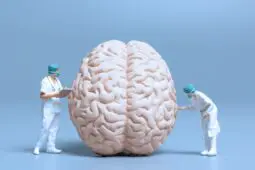
Clinical Practice & Guidance
Tips and techniques from your colleaguesCommunity Mental Health Today
Encompassing the Big & the SmallThe promise of the community mental health movement of the 1960s, providing high-quality psychological and social services to poor families, remains unfullled... Read more
A Brain Science Strategy for Overwriting Traumatic Memories
Creating Juxtaposition Experiences to Relieve Trauma SymptomsBrain science offers powerful guidance for freeing clients from the distress triggered by disturbing implicit memories. Read more
IFS for Self-Compassion
Some Forms of Self-Love Are Harder than OthersIFS founder Dick Schwartz believes a genuine state of self-compassion entails a journey into multiple parts of yourself that may include the good, the bad, the... Read more
Life after Trauma
What are the possibilities for post-traumatic growth?The new emphasis on the transformative power of trauma can be a template for false assumptions about the “gift” of suffering and the meaning of recovery. Read more
The Intentional Divorce
Helping Couples Let Go with DignityThe therapist's job is to help client couples close one door and open another. Read more
Fifteen years ago, psychotherapist Jeffrey Kottler never imagined he’d be stuffing nine duffel bags full of antibiotics and suture kits for a return trip to... Read more
How Psychotherapy Helps Us Recover the Beauty in Our Lives
Questions for Helping Therapy Clients Reclaim MeaningMany walk into the therapist's consulting room exactly at the moment that they have been stripped to the core of their being. While not at the physical... Read more
Burnout Reconsidered
What Supershrinks Can Teach UsJessica, a counselor in her mid-30’s, works at a large, public mental health clinic in a major metropolitan area. Her workday begins early, the alarm... Read more
Getting Over Weight?
A Critic of our Cultural Obsession Goes Too FarA critic of one of our central cultural obsessions goes too far Read more
Defusing Male Shame
Understanding the Significance to Male ClientsShame is an emotion that isn’t healthy. Unlike guilt–which causes remorse for something you did wrong–shame can cause someone to feel as... Read more
The State of Our Art
Do Our Old Ways Fit the New Times?While the number of people in psychotherapy keeps declining, surveys reveal that potential clients would still rather talk to a therapist than fill a... Read more
It’s time we address the psychological toll of the daily bombardment of information that permeates our lives. Read more
To stay relevant in a changing world, we need to address the engagement styles of today’s prospective clients. Read more
Narrowing the Gap
Striving for Honesty in the Therapy RoomIrv Yalom explores what it means to be honest with a client in session, even when that means processing your clients' fears of your death. Read more
Seven Myths about Meditation
A One-Size Approach Doesn’t Fit AllSeven myths about meditation for clinicians to ponder. Read more
VIDEO: Who Should You Talk To?
Janina Fisher on how and when to speak to a client’s “child part”When an adult is in your consulting room, it’s understandable if you use adult language and logic. But at certain points in the healing process, you may need... Read more
Meditation for Slow Learners
Mindfulness Goes Big TimeOver several thousand years, different cultures around the world have discovered how to nurture the seed of a specifically human capacity for mentally stepping... Read more
The Anxious Client Reconsidered
Getting Beyond the Symptoms to Deeper ChangeAnxiety attacks anything and everything in a person's life. Sometimes the targets are the mundane activities that others take for granted. At other times, it... Read more
Letting Go of Our Facade
To Tell the TruthTherapists aren't supposed to discuss personal problems, or even acknowledge having any. While preaching congruence, who among us has never pretended fondness... Read more
What is the Most Powerful Way of Knowing?
Eugene Gendlin Describes The “Felt Sense”According to Eugene Gendlin, legendary originator of Focusing, exploring thoughts on the body can lead us to a new kind of wisdom. Read more
A few decades ago, when young therapists like myself watched Salvador Minuchin, Virginia Satir, Carl Whitaker, or other leading lights, it was like... Read more
The CBT Path Out of Depression
Two Perspectives on How It WorksWhile widely acknowledged to be the most empirically supported therapy ever invented, cognitive behavioral therapy (CBT) is often criticized for being too... Read more
Escaping the Trance of Depression
Three Techniques of Acknowledgement and PossibilityBecause depressed clients repeat the same thoughts, feelings, and experiences over and over again, successful treatment breaks clients out of this trance. Read more
It Takes One to Tango
You Don't Need Both Partners to Do Couples TherapyYou don't need both partners to do couples therapy; working with individuals isn't impossible, it's just based on different premises. Read more
Passionate Marriage
Helping Couples Decode the Language of Their SexualityHow couples behave in bed is a remarkablv authentic expression of their emotional connection-or lack of it. Read more
Bubble-Wrapping Our Children
The Perils of Overprotective ParentingWe've become so focused on keeping children safe that we exaggerate the dangers they face despite the fact that they’ve never been safer. Still, no amount of... Read more
The Power of the Pen in Therapy
Some Journaling Exercises to Enhance Your WorkSome guidelines for bringing the creative power of therapeutic journaling into your work. Read more
VIDEO: Bringing the Family Into Trauma Treatment
Mary Jo Barrett on Family ConsultationsIn this brief video clip, Mary Jo explains why bringing the family into therapy should be our first stop when treating trauma. Read more
VIDEO: Helping Traumatized Clients Understand their Automatic Responses
Richard Schwartz Explains Why Panicked Trauma Responses are Also Defensive OnesIn this brief video clip, Richard explains how trauma survivors can have a dialogue with the damaged inner parts—the “Exiles”—by first consulting their... Read more


























